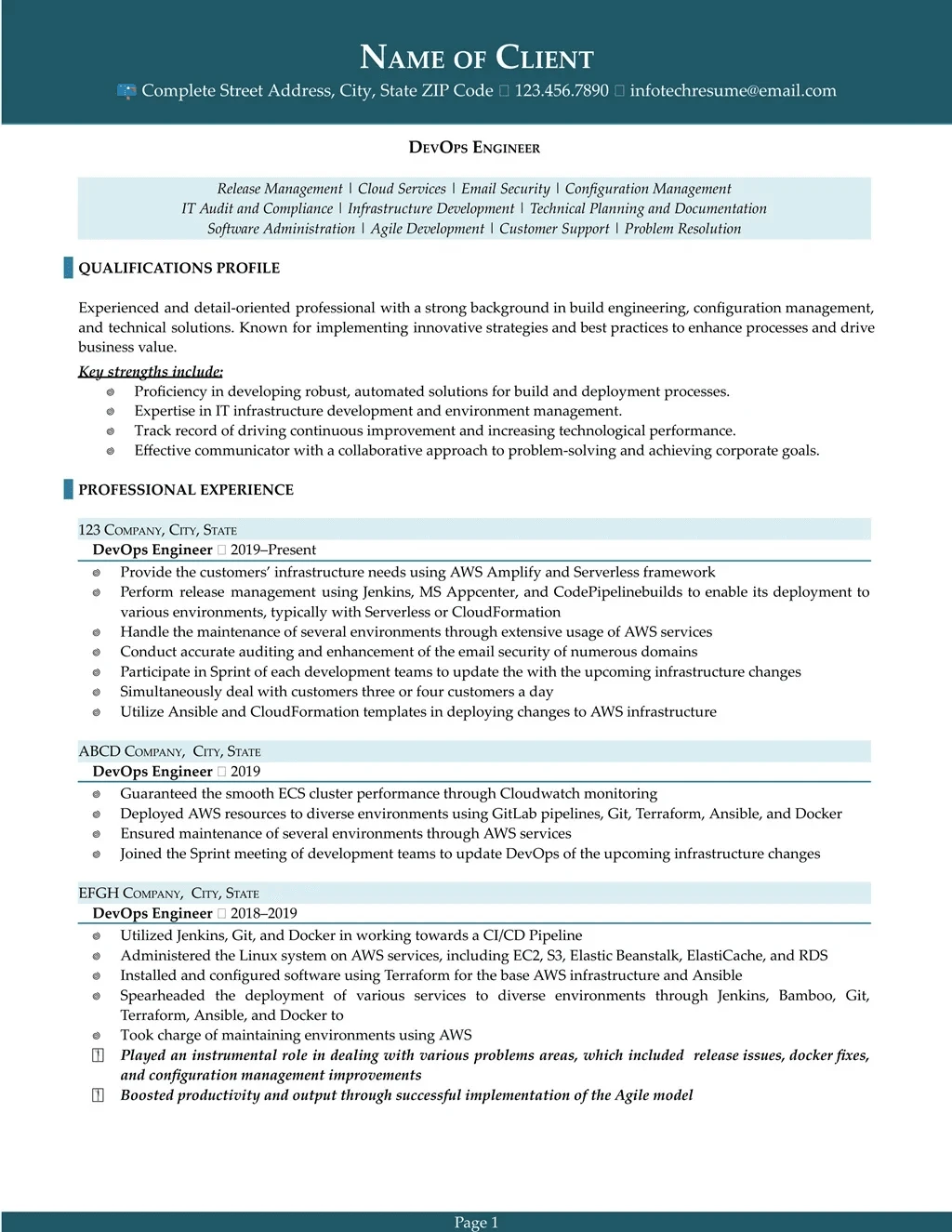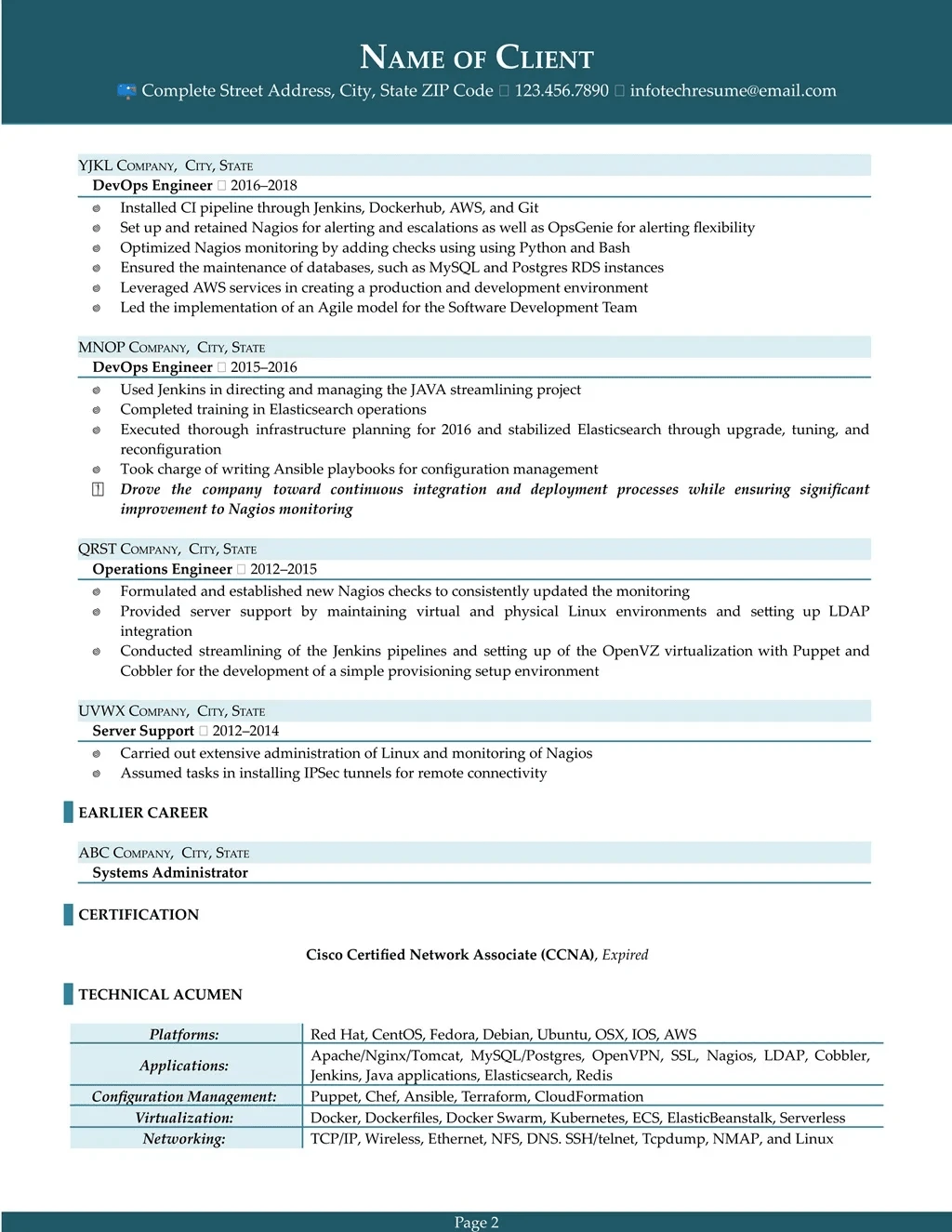As organizations strive for agility and scalability, the demand for skilled DevOps professionals continues to surge, as they play a pivotal role in ensuring efficient software delivery and infrastructure management. Hence, more and more continue to consider this career path and power through the various hurdles they must face to land their dream job.
One of such is passing the job application phase, wherein candidates must be armed with a compelling resume that highlights their qualifications and skills in the best light possible. However, writing one goes beyond just listing them in a document. Instead, DevOps engineers must be able to showcase their expertise, experience, and achievements in a way that positively grabs the attention of recruiters and hiring managers.
In a competitive job market, a well-crafted resume can make all the difference in securing interviews and landing your dream role as a DevOps engineer. So, if you’re ready to elevate your job search game and stand out from the crowd, dive into our comprehensive guide and learn how to showcase your expertise effectively through your DevOps engineer resume.
What is a DevOps Engineer?
A DevOps engineer is a skilled IT professional who specializes in bridging the gap between software development (Dev) and IT operations (Ops) teams within an organization. Their primary focus lies in fostering collaboration, enhancing communication, and promoting efficiency across the software development lifecycle. They’re instrumental in implementing practices and tools that facilitate continuous integration, continuous delivery, and automation, ultimately enabling teams to deliver high-quality software at a rapid pace.
DevOps engineers possess a unique blend of technical skills, including proficiency in programming, system administration, and infrastructure management. In addition, they have a deep understanding of software development methodologies and operational best practices. Hence, they help drive organizational agility, promote innovation, and ensure the stability and scalability of IT systems in today’s fast-paced digital landscape.
Apart from facilitating smoother development workflows, DevOps engineers also manage and maintain the underlying infrastructure that supports software applications. This includes provisioning and configuring servers, managing cloud services, implementing monitoring and alerting systems, and ensuring scalability and reliability of the infrastructure.
DevOps Engineer Job Outlook in the United States
The job outlook for DevOps engineers in the United States is highly promising, reflecting the growing demand for professionals who can effectively bridge the gap between development and operations in the IT industry. Organizations are investing in DevOps practices to accelerate software development cycles, improve collaboration between teams, and automate infrastructure management processes. Consequently, DevOps engineers are expected to remain in high demand as companies seek to optimize their IT operations and stay competitive in the digital age.
According to the US Bureau of Labor Statistics (BLS), the employment of software developers, including DevOps engineers, is projected to grow 25% from 2022 to 2032, much faster than the average for all occupations. This surge in demand is driven by the increasing reliance on software for various applications across industries, ranging from healthcare to finance, and the need for organizations to continuously innovate and adapt to changing technological landscapes.
With ample opportunities for growth and advancement, the field of DevOps engineering presents promising prospects for aspiring professionals looking to embark on a rewarding career path in technology.

Common Responsibilities of a DevOps Engineer
DevOps engineers’ responsibilities encompass a wide range of tasks aimed at optimizing software development processes, enhancing collaboration between teams, and ensuring the stability and scalability of infrastructure. Below are 10 common ones they usually perform:
- Implementing Continuous Integration/Continuous Deployment (CI/CD) — Establishing and maintaining pipelines to automate the build, test, and deployment of software
- Managing Infrastructure as Code (IaC) — Utilizing tools like Terraform or Ansible to provision and configure infrastructure resources programmatically
- Monitoring and Performance Optimization — Setting up monitoring tools to track system performance and proactively identifying and addressing bottlenecks
- Ensuring Security and Compliance — Implementing security best practices and ensuring compliance with regulatory requirements throughout the development and deployment lifecycle
- Collaborating with Development and Operations Teams — Facilitating communication and collaboration between developers, QA engineers, and system administrators to streamline processes
- Troubleshooting and Debugging — Investigating and resolving issues related to software deployment, configuration, and performance
- Automating Manual Processes — Identifying opportunities for automation and developing scripts or tools to streamline repetitive tasks
- Containerization and Orchestration — Using containerization technologies like Docker and orchestration tools like Kubernetes to manage and scale containerized applications
- Version Control and Configuration Management — Implementing version control systems (e.g. Git) and managing configuration files to ensure consistency across environments
- Disaster Recovery and High Availability Planning — Developing and testing disaster recovery plans and implementing strategies to ensure high availability of critical systems and services
Important Keywords to Include in a DevOps Engineer Resume
In crafting a DevOps engineer resume that catches the eye of recruiters and hiring managers, the strategic inclusion of relevant keywords is important. These keywords not only help your resume pass through applicant tracking systems but also demonstrate your expertise and proficiency in key areas of DevOps. Below, we’ll explore essential skills and action verbs to incorporate into your resume:
Skills
Ensure your DevOps engineer resume includes a comprehensive list of key skills that showcase your capabilities and expertise in various aspects of DevOps, such as the following:
- CI/CD
- IaC
- Containerization Technologies (e.g., Docker, Kubernetes)
- Cloud Platforms (e.g., AWS, Azure, Google Cloud)
- Automation Tools (e.g., Ansible, Puppet, Chef)
- Scripting Languages (e.g., Python, Bash, Ruby)
- Version Control Systems (e.g., Git, SVN)
- Monitoring and Logging Tools (e.g., Prometheus, ELK Stack)
- Agile Methodologies
- Collaboration and Communication Skills
Action Verbs
Make sure to use dynamic action verbs in your resume to effectively communicate your achievements and contributions. Some examples you can consider are as follows:
- Implemented CI/CD pipelines to automate software deployment processes
- Optimized infrastructure using IaC principles to achieve scalability and reliability
- Managed containerized environments using Docker and Kubernetes for efficient deployment
- Automated repetitive tasks using scripting languages like Python and Bash
- Collaborated with cross-functional teams to streamline development workflows
- Deployed monitoring solutions to ensure system performance and reliability
- Configured cloud infrastructure on AWS/Azure/GCP to meet project requirements
- Resolved technical issues and debugging problems in production environments
- Mentored team members on DevOps best practices and tools
- Championed the adoption of DevOps culture and practices within the organization

How to Write an Effective DevOps Engineer Resume
To stand out in the competitive job market and showcase your skills and expertise to potential employers, your resume must effectively highlight your qualifications, experience, and accomplishments in the field of DevOps.
To create a compelling resume that captures the attention of hiring managers, here are some resume writing tips and steps you can follow:
1. Understand the job requirements.
Before diving into resume writing, carefully review the job description to understand the specific skills, experience, and qualifications sought by employers. Tailor your resume to align with the job requirements, emphasizing relevant experiences and technical proficiencies that match the employer’s needs. Also, it can help to review a DevOps engineer resume example as your reference on how to format it best for your needs.
2. Craft a strong resume summary or objective statement.
Begin your DevOps engineer resume with a concise and impactful summary or objective statement that highlights your key skills, experiences, and career goals. Use this section to provide a snapshot of your qualifications and to grab the attention of recruiters, showcasing what sets you apart as a DevOps engineer.
3. Highlight technical skills and proficiencies.
Create a dedicated section to showcase your technical skills and proficiencies related to DevOps tools, technologies, and methodologies. Include a comprehensive list of relevant skills such as programming languages, automation tools, cloud platforms, containerization technologies, and version control systems.
4. Showcase relevant experience.
Detail your work experience, focusing on roles and projects that demonstrate your expertise in DevOps practices and principles. Highlight specific achievements, such as successful implementation of CI/CD pipelines, automation initiatives, or improvements in system performance and reliability.
5. Quantify your impact.
Quantify your accomplishments wherever possible by including metrics, statistics, or tangible results that illustrate the impact of your work. Whether it’s reducing deployment time, increasing system uptime, or improving team efficiency, quantifiable achievements provide concrete evidence of your contributions as a DevOps engineer.
6. Demonstrate collaboration and communication skills.
Highlight your ability to collaborate effectively with cross-functional teams and communicate complex technical concepts to stakeholders. Showcase experiences where you’ve worked closely among development, operations, and other teams, emphasizing your role in fostering a culture of teamwork and innovation.
7. Keep it clear, concise, and professional.
Ensure your resume is well-organized, easy to read, and free of errors. Use a clean and professional format, consistent fonts, and concise language. Also, tailor the length of your resume to highlight the most relevant information while keeping it concise and focused on your qualifications.
DevOps Engineer Resume Example
Now that you’re aware of the basics on how to write your resume for a DevOps engineer role, here’s a resume sample of what it looks like and how the sections and components are carefully laid out to guide you better:


Download a copy of this DevOps Engineer resume example.
Let Seasoned DevOps Engineer Resume Writers Take Care of Your Resume
Being in a lucrative and competitive field of software development and information technology, there may be a lot of hurdles you may face in your job search. Add to that the challenge of writing your own resume to ensure you get the attention of recruiters and hiring managers.
The good thing is that you can let professionals take care of your resume needs. Check out the best IT resume writing services from Infotech Resume and reap the rewards of having your job search tools well-crafted by career experts! For other queries or if you need more help on how to get started, contact us today.





